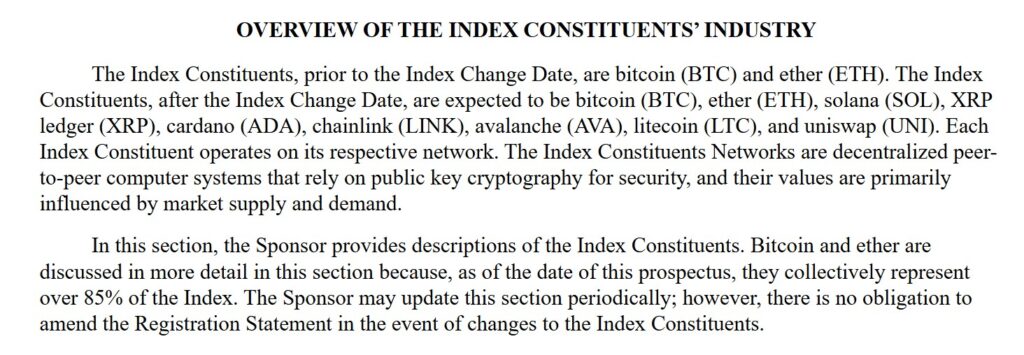In a significant move for the cryptocurrency investment landscape, asset manager Hashdex has updated its S-1 regulatory filing for its cryptocurrency index exchange-traded fund (ETF) to potentially include seven altcoins alongside Bitcoin (BTC) and Ether (ETH). As reported on March 14, this amended filing suggests the addition of notable altcoins such as Solana (SOL), XRP, Cardano (ADA), Chainlink (LINK), Avalanche (AVAX), Litecoin (LTC), and Uniswap (UNI) to its index ETF.
Currently, as of March 17, Hashdex’s Nasdaq Crypto Index US ETF exclusively holds Bitcoin and Ether, marking a significant evolution in its asset offerings. Previous documents hinted at the future inclusion of other cryptocurrencies but did not specify which ones would make the cut. According to the recent filing, the proposed altcoins are characterized as decentralized peer-to-peer systems that depend on public key cryptography for their security, with their values subject to the ebb and flow of market supply and demand.
The revision comes at a time when issuers are ramping up their plans for crypto products, buoyed by a change in sentiment from U.S. regulators, following directives from President Donald Trump for a more relaxed approach toward digital asset regulation. The filing also indicates plans for Hashdex to transition its reference index from the Nasdaq Crypto US Index—which previously tracked only Bitcoin and Ether—to a broader Nasdaq Crypto Index, though a timeline for this change remains undisclosed and hinges on approval from the U.S. Securities and Exchange Commission (SEC).
“The next logical step is index ETFs because indices are efficient for investors — just like how people buy the S&P 500 in an ETF. This will be the same in crypto,”
said Katalin Tischhauser, head of investment research at crypto bank Sygnum. This sentiment echoes the ongoing transition in the cryptocurrency ETF landscape, which has seen the SEC recently approve both Hashdex’s and Franklin Templeton’s Bitcoin and Ether index ETFs. Since their listings in February, these ETFs presented investors with a diverse gateway into the crypto market, albeit with modest initial inflows.
Furthermore, Hashdex’s initiative aligns with the broader trend observed among industry players, including Grayscale, which is seeking to convert its Digital Large Cap Fund into an ETF. This strategic pivot indicates a robust interest in offering diversified crypto index ETFs as the market evolves, capturing the attention of investors eagerly seeking efficient and accessible investment opportunities in the digital asset space.
Key Developments in Cryptocurrency ETF Landscape
The recent amendments to Hashdex’s S-1 filing regarding its cryptocurrency index ETF could significantly impact investors and the broader crypto market. Here are the key points to consider:
- Addition of Altcoins:
- Hashdex plans to add seven altcoins: Solana (SOL), XRP (XRP), Cardano (ADA), Chainlink (LINK), Avalanche (AVAX), Litecoin (LTC), and Uniswap (UNI).
- This diversifies the ETF beyond just Bitcoin (BTC) and Ether (ETH), potentially offering investors broader exposure to the crypto market.
- Regulatory Context:
- The recent directive from US President Donald Trump encouraging leniency in digital asset regulation may accelerate the approval process for crypto products.
- The SEC’s approval is necessary for the proposed changes, highlighting the regulated nature of cryptocurrency investment.
- Market Dynamics:
- The values of these altcoins are influenced by market supply and demand, which could lead to increased volatility and investment opportunities.
- The transition to a broader index may attract more investors looking for diversified options in the cryptocurrency space.
- Competitive Landscape:
- Other asset managers are also pushing for cryptocurrency ETFs, indicating a growing market trend.
- The success of Hashdex and Franklin Templeton’s Bitcoin and Ether ETFs sets a precedent for more diversified crypto investment products.
- Investment Efficiency:
- Index ETFs can simplify investment in cryptocurrencies, similar to how traditional stock market indices function, making it easier for individuals to engage with the crypto market.
- This could potentially lead to greater retail investor participation in cryptocurrencies.
“The next logical step is index ETFs because indices are efficient for investors.” – Katalin Tischhauser, head of investment research at Sygnum
Hashdex’s Bold Move: Expanding Crypto ETF to Include Altcoins
Hashdex, a notable player in the asset management space, has recently updated its S-1 regulatory filing, seeking to broaden its cryptocurrency index ETF beyond just Bitcoin (BTC) and Ether (ETH) to incorporate an exciting mix of seven altcoins including Solana (SOL) and Cardano (ADA). This strategic shift comes on the heels of a more accommodating regulatory environment following directives from the U.S. government. But how does this move stack up against similar offerings in the increasingly crowded cryptocurrency ETF market?
Competitive Advantages:
One of the primary advantages of this revised filing is the inclusion of a diversified selection of altcoins, potentially attracting investors who are looking for a more comprehensive entry into the crypto markets. With the SEC’s recent approvals for multiple ETF listings, including those from Franklin Templeton, Hashdex appears poised to capture investor interest by being one of the first major ETFs designed for diversification. The potential shift to a broader crypto index can appeal to those looking for less exposure to Bitcoin’s volatility.
Moreover, this move aligns with industry trends indicating a rising appetite for more complex cryptocurrency products, suggesting that Hashdex is in tune with investor sentiment. In an environment where traditional financial products might feel stale, the excitement surrounding altcoin investments keeps the momentum alive.
Competitive Disadvantages:
However, there are inherent risks in tapping into this array of altcoins. Each of these cryptocurrencies carries its unique volatility and regulatory scrutiny, which might deter conservative investors. Competing ETFs from Grayscale also emphasize a mix similar to Hashdex’s updated proposal, which could fragment investor focus and dilute market interest.
Additionally, regulatory challenges remain a concern. Although the push for leniency is evident, the SEC’s approval process is still rigorous. Should Hashdex face delays or rejections, it could be seen as falling behind its competitors, who may gain traction in the ETF space while waiting for regulatory clearance.
Potential Beneficiaries and Challenges:
This expanded ETF could be particularly beneficial for novice investors looking to dip their toes into the crypto world without navigating the complexities of individual altcoin investments. It offers a straightforward, “one-stop-shop” solution that might appeal particularly to institutional investors seeking diversification with reduced risk exposure. On the flip side, more advanced investors who wish to hone in on specific altcoins might find this ETF limiting.
As the landscape evolves, Hashdex’s decision has the potential either to bolster a growing investment trend or complicate the choices available for investors. It remains to be seen how this will influence investor behavior and the broader market dynamics in the crypto ETF arena.

















